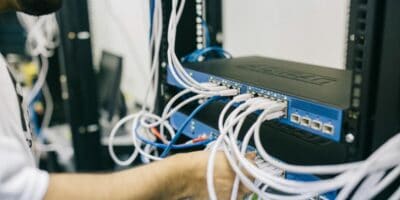
If you are looking to get into a tech career, you will often hear people talk about data and computer science. Pursuing either path can lead to a long and fulfilling career and so they are both fantastic choices for a degree. If you have done your research and have been able to choose one over the other, congratulations! For those who are yet to make up their minds, this article is a deep dive into the two degree and career paths, looking at their pros and cons and doing a comparison so you can see which one would be the better option for you.
Data Science and Computer Science: An Overview
Both data science and computer science deal with what you would surmise from looking at their names, namely data and computers respectively. While there is an overlap, especially with computer science often bleeding into data science, these are two distinct fields.
Data science, according to popular sources, is a field that extracts insights and knowledge from noisy, unstructured and structured data using various processes, systems and algorithms. The insights and knowledge so extracted then turned into actionable insights that are used in various other fields and domains.
Computer science, on the other hand, entails studying computers and computing, including various elements of their practical and theoretical applications. Computer science relies heavily on the principles of mathematics and engineering. It also applies knowledge to various other areas including artificial intelligence, machine learning as well as hardware and software programming.
Why Pursue a Data Science Degree?
An obvious advantage of pursuing a data science degree is that it is typically the fastest way to become a data scientist. When applying for jobs in the field, listing ‘Data Science’ as one of your education qualifications puts you way ahead of other candidates who are competing for the same positions. A data science degree comes with a signaling aspect that indicates you would be a great fit for the right positions.
Having completed the degree indicates that you are serious about getting into this field and shows potential employers that you are interested in working with data. Because many employers already know what completing the degree entails and that the degree teaches the right skills, they do not have to worry about your analytical understanding of models or data, data-sorting, or visualization abilities, or even programming skills.
This is especially important in fields where employers require that you have some programming knowledge which you can combine with an innate ability to understand data and extract insights and knowledge from it.
Next, you do not need extra certification to work in specialized areas; your data science degree will have already taught you everything you need to know to thrive in data science fields.
The Downside of Pursuing a Data Science Degree
A major downside of pursuing a data science degree is availability. The field used to be part of other fields and so there are not too many undergraduate or even graduate data science programs. Students interested in the field have had to go out of their way to pursue this path.
In cases where they cannot find suitable programs in colleges and universities they are interested in, they pick other concentrations, seeing them as a way to pivot into data science later. Many end up losing interest in the field.
In research done by Forbes, only about 50% of all data scientists in the field have graduated from one of the top 200 universities. Many of these universities did not offer any undergraduate or graduate data science degrees. Additionally, only about a fifth of data scientists have graduated with a data science degree.
The viable path for many data scientists, it seems, is to graduate from a prestigious school with a tangential degree and then acquire additional certifications to break into the data science field. For many people, the pedigree and prestige of the universities they graduate from are becoming more important than the degree they pursue, as long as they end up becoming data scientists.
Combining Courses into a Single Degree: Interdisciplinary Degrees
Some universities around the world now allow their students to change their focus to interdisciplinary majors. These are personalized majors that entail taking two or more courses from more than one major. They allow students to pick the courses they want from different majors and departments and combine them into one degree.
This works very well for data science students because data science is usually a combination of data analytics and storytelling, coding, and mathematics. Combining math, statistics, and computer science, plus other disciplines like economics leads to a mix of skills that are required for a fully-fledged data scientist.
The main benefit of doing this is that students do not have to study or topics they do not need to. For example, many data scientists do not have to study Pure Mathematics, various aspects of computer science, or even the policy models found in economics. By eliminating all these extra topics, students can study the perfect mix of skills that are required for a data scientist.
To go down this path, you need to find universities that allow you to do this. You can then compare whether the mix of courses available is on a par with what is expected and comparable to those offered in a pure data science degree.
Data Science is Niche
One last thing to know is that data science is rather niche. If you pursue data science, you will get less career flexibility compared to pursuing degrees like computer science or statistics. Both these paths allow you to get into data science, with some extra certifications in many cases, and also give you the flexibility to alter your career trajectory if things do not go as expected.
Why Pursue a Computer Science Degree?
Computer science is a well-known degree that has been around for decades. Most employers know what to expect from those holding a computer science degree. Recruiters and employers alike favor people who have graduated with a computer science degree since they know what it is all about.
The other major advantage of pursuing computers is the size of the field you will be getting into. Computers and technologies associated with them have become a part of our lives and these technologies require people to develop and maintain them.
Additionally, new technologies are cropping up every day that can change the way we view technology. All of these require people with the right skills and those who hold a computer science degree are perfect for roles that involve these technologies.
Pursuing a computer science degree allows for a degree of specialization that only a select number of degrees allow. You can get into artificial intelligence and machine learning, programming, data analytics, cybersecurity and so much more.
To be able to pursue these specializations, you need to have completed a bachelor’s degree in computer science and an advanced computer science degree. The Master’s degree in computer science from Worcester Polytechnic Institute, for example, prepares you for a dynamic future in a computer science field by arming you with the skills you need to thrive in any of the many computer science specializations.
Computer science also allows you to pursue careers where you work how you like. If you love working as an individual, in a team, or collaboratively, computer science allows you to do any of these. Also, computer science positions are very lucrative. Some are more lucrative than others, with careers like Software Development and Computer Networks attracting salaries of over $100,000.
Lastly, perhaps the biggest advantage of computer science is the flexibility you have. Because of the huge number of specializations you can get into, it is easy to change your career trajectory when you pursue a computer science degree. For example, you could transition from a software engineer to a data analyst without this being an issue for you.
This flexibility also extends into programming languages for those who want to primarily work on programming and coding. While there is some nuance to every programming language, the principles and basics are the same, so it is easier to switch between them. Do note that this does not apply to advanced programming as this is where the nuances and differences in most programming languages become apparent. However, most programmers and coders can switch from one programming language to another as long as they have a solid grasp of programming fundamentals.
The Downsides of Pursuing a Computer Science Degree
One of the main downsides of pursuing a computer science degree, especially if you do not want to program or code, is that it is too broad. Every computer science degree includes some programming, and this might not align with your interest. For example, if you want to go into networking, programming and coding might not interest you. Less code-savvy students can find some aspects of computer science to be too challenging and thus drop out.
If you’ve set your heart on becoming a data scientist, you have to learn some coding via a coding bootcamp in Sacramento, or a class wherever you’re based. That aspect of computer science is unavoidable since every Computer Science program makes sure to give its students the fundamentals. Some students view this as a con.
Lastly, computer science favors discrete thinking over probabilistic thinking. Discrete thinking is where you must be certain 100% of the time. This can be great when writing software or dealing with a cybersecurity issue, but it can be problematic when you have to use probabilistic thinking in fields such as data science.
In data science, probabilistic thinking allows for some concession that there is always a chance that something will not happen and thus you cannot be 100% sure about it. Probabilistic thinking is also applied in many other fields where outcomes are not guaranteed, and you cannot have all the data you need to make decisions.
Comparing Computer Science and Data Science Degrees
Now that we understand the upsides and downsides of both degrees, how do they compare? Computer science is a lot more widespread than data science, and this means that the availability of universities offering the degree should not be a problem.
Since computer science has been around for a lot longer, more employers understand it, and landing an internship and even a paid position should not be an issue. Landing an internship will make it easier to land a computer science job.
Another upside of pursuing computer science is that about 50% of data scientists come from a computer science background and one of the top 50 universities offering the degree according to Forbes. This means computer scientists have a high chance of landing a data science position if they so wish.
When you put the availability of degrees aside, Data Science arms you with just the right skills you need to thrive as a data scientist. In contrast to computer science which is often broader, data science focuses on a narrower set of skills and excludes those you might not use, such as software development. Unless you want to pivot your career, there is no need for external certifications or courses.
A data science degree is tailored towards data scientists with little flexibility. This means it would be difficult to get out of the field once you are in it and this limit on future career changes is what makes computer science so desirable.
There is no doubt that computer scientists are in great demand right now. This is because we are in a time when technology is exploding, and we are getting increasingly reliant on computers and associated technologies. On the other hand, Data Science is also growing as more organizations realize the value of data and how to use it correctly. From past data, we can expect to see changes where data science degrees become the better option. However, because employers increasingly value skills and experience, there is very little to hinder your progress in this field. Before data science becomes a top degree, however, we can conclude that computer science is the better degree for the current job market.









